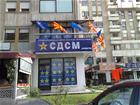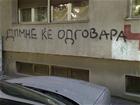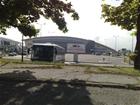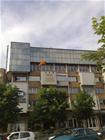Coffee, Turkish delight and pre-election passion in Macedonia
Evelina Topalova, May 19, 2011
 The election campaign for the June 5th snap parliamentary elections in Macedonia kicked off officially on May 16th. MP candidates listed in 18 lists, submitted by parties and coalitions, will compete for the votes of 1.8 mn voters.
The election campaign for the June 5th snap parliamentary elections in Macedonia kicked off officially on May 16th. MP candidates listed in 18 lists, submitted by parties and coalitions, will compete for the votes of 1.8 mn voters.
As euinside already reported, according to the latest amendments to the electoral code, Macedonians living abroad will be given for the first time right at these elections to choose their own representatives in Parliament. Thus the number of lawmakers will increase from the current 120 to 123 with the  three MPs elected by the Diaspora in Australia, Europe, America and Canada.
three MPs elected by the Diaspora in Australia, Europe, America and Canada.
In the course of the next less than 20 days the MP candidates will woo the voters to win their vote. As all recent surveys indicate the two major parties in the next parliament will be again the VMRO-DPMNE, that is currently ruling, and the oppositional SDSM, we have decided to take a look ate their election programmes and find out what are they promising to the voters on some key issues.
The campaign has not been launched yet when the party of outgoing Prime Minister Nikola Gruevski, VMRO-DPMNE, accused the SDSM of trying to bribe the voters by offering them free coffee, Turkish delight and pastry. They claim that the main opposition party has purchased 12,000 kg of coffee that the party will allegedly give to people. I would be surprised if a voter sells its vote for 100 grams of coffee, as the ruling party has calculated, but let's see what the VMRO-DPMNE's election programme is offering.
 While reading their programme, I couldn't get rid of the feeling that VMRO-DPMNE is offering not just reforms, as their election slogan says, but "milk and honey". It is not lacking some specifics though:
While reading their programme, I couldn't get rid of the feeling that VMRO-DPMNE is offering not just reforms, as their election slogan says, but "milk and honey". It is not lacking some specifics though:
- to guarantee sustainable economic growth, which is expected to reach 4-5 % in 2012-2013 and 5.5-7% in 2014-2015;
- to increase public investments to 4-5 of GDP from 3.7 % of GDP in the last few years;
- FDI to rise from 350-400mn in 2012 to 550-650mn euros in 2015;
- to cut the unemployment rate below 25% (in comparison that rate in 2011  stands at 30.9 %);
stands at 30.9 %);
- to make Macedonia the country with lowest taxes in Europe - among the measures are to abolish the tax on small and medium enterprises that have a total annual revenue of 3 mn denars (50,000 euros)
- to cut VAT for the tourist services from 18 to 5%;
- to raise the salaries in the public sector and the public administration by 21.3% for the period of 2012-2015;
- to raise the pensions by a total of 24.2 % in 2012-2015 period.
 In the foreign policy chapter of the programme the party reiterates that membership in the EU and NATO remains a priority. It is interesting to find out how the VMRO-DPMNE sees the solution of the long-standing name dispute with Greece, which the party has failed to resolve during its term in office. The party says that it advocates reaching a compromise solution that would not be to the detriment of Macedonia's national identity, nation and language. VMRO-DPMNE will not accept a change to the constitution, aimed at changing the constitutional name of Republic of Macedonia and will not allow a decision to be made before the proposal is approved at a referendum by citizens.
In the foreign policy chapter of the programme the party reiterates that membership in the EU and NATO remains a priority. It is interesting to find out how the VMRO-DPMNE sees the solution of the long-standing name dispute with Greece, which the party has failed to resolve during its term in office. The party says that it advocates reaching a compromise solution that would not be to the detriment of Macedonia's national identity, nation and language. VMRO-DPMNE will not accept a change to the constitution, aimed at changing the constitutional name of Republic of Macedonia and will not allow a decision to be made before the proposal is approved at a referendum by citizens.
Thus declared this stance shows that if the VMRO-DPMNE would win the elections, it will continue with the policy led so far and will not make any concessions over the row, despite the willingness to find a mutually acceptable solution. This will mean that Macedonia will be kept NATO's threshold for some time and will have to wait until it receives a date to start accession talks with the EU.
The main opposition force SDSM led by Branko Crvenkovski also pays attention to the economic and social problems the country is facing. Their aim will be:
- to increase the domestic production and reach sustainable economic growth of about 6%;
- to stop spending on unnecessary cultural projects and marketing campaigns;
- to create new jobs;
- to raise public investments to above 5.5% of the GDP;
- to abolish flat tax as it deprives poor people and to establish progressive  taxation;
taxation;
- to back small and medium enterprises;
- to cut VAT for the tourist services to 5% and decrease tourist taxes to 50%;
- decentralisation;
- to increase the aids for elderly people over 70.
The SDSM also believes that membership in the EU and NATO should be the main strategic priority of the country. The party, however, estimates that the rows with Greece and Bulgaria should not hamper political, economic and cultural co-operation with these countries. There is no point in discussing whether the disputes are well-grounded and objective or not, the programme says. The key point here is that foreign policy should be based on finding exit strategies, while with the name row with Greece they recommend more competence and determination to solve the problem. This could mean possible eagerness to make concessions in the name of achieving the strategic foreign policy priorities.
 The election race will not be focused only on these two players. It is important to see what will be the distribution of votes of the Albanians, as in the past years there was no government without representatives of some of the parties of the ethnic Albanians. Another essential thing during the campaign and after the elections is to avoid any kind of violence. Representatives of 30 political parties have signed prior the election campaign a code of conduct and committed themselves to guarantee free and fair elections. And last but not least - conducting the vote according to the international standards is essential also for the EU integration of the country, which is still waiting for a date to start accession talks with the 27-nation bloc.
The election race will not be focused only on these two players. It is important to see what will be the distribution of votes of the Albanians, as in the past years there was no government without representatives of some of the parties of the ethnic Albanians. Another essential thing during the campaign and after the elections is to avoid any kind of violence. Representatives of 30 political parties have signed prior the election campaign a code of conduct and committed themselves to guarantee free and fair elections. And last but not least - conducting the vote according to the international standards is essential also for the EU integration of the country, which is still waiting for a date to start accession talks with the 27-nation bloc.
 Bakir Izetbegovic, Andrej Plenkovic | © Council of the EU
Bakir Izetbegovic, Andrej Plenkovic | © Council of the EU Aleksandar Vucic, Recep Tayyip Erdogan | © Serbian Presidency
Aleksandar Vucic, Recep Tayyip Erdogan | © Serbian Presidency Jean-Claude Juncker, Zoran Zaev | © European Commission
Jean-Claude Juncker, Zoran Zaev | © European Commission